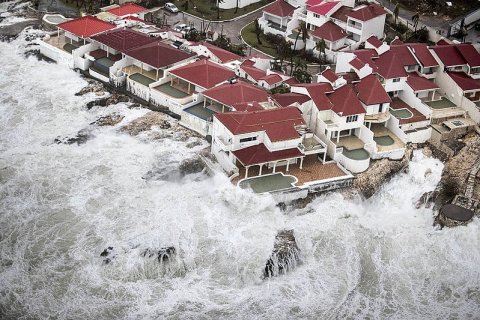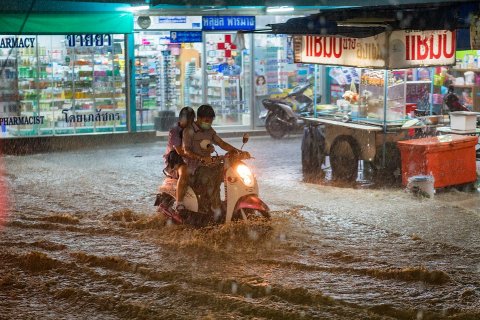Institutions, Natural Hazards and the Local Economy (INHaLE)
Institutions, Natural Hazards and the Local Economy (INHaLE)

Natural hazards are increasingly important. After Harvey, Irma and the extreme monsoon causing flooding in South East Asia, it is clear that natural hazards cause enormous damage and human suffering. Their increasing importance has been tied to Climate Change and Global Warming on the one hand and to Demographic and Economic Geography trends on the other. More people are more vulnerable, especially in developing countries. INHaLE seeks to help people, businesses and governments to reduce and manage this vulnerability.

It should be obvious that the efficient management of natural hazard risks is an inherently multi- and transdisciplinary challenge. We need to link high resolution GEO information systems and state of the art geo- and hydrological models to understand the changing nature of the risks and map these into vulnerabilities (populations and assets exposed).
Modern finance and public sector economics can be applied to help private and public agencies decide where to invest in what mitigation and adaptation options. Governance and legal scholars can design effective and efficient legal and governance structures. This can help especially developing countries tackle their increasing vulnerability. Addressing this global challenge is both urgent and important. And Utrecht University, boasting excellent research in all relevant (sub)disciplines, is uniquely positioned to host a world class transdisciplinary research group to tackle this challenge.
Activities proposed for first stage
In the first stage, we aim to organise a workshop at Utrecht University (June 2018) where we invite a small number of guests from global natural hazard management institutions to present the main challenges they face in their work. Earlier fruitful collaborations, ensures this workshop will generate new ideas, both in the areas of research and (executive) education. We foresee projects on such topics as:
- financing adaptation and mitigation investments under uncertainty
- using (changing) hazard risks and vulnerabilities in social cost benefit analysis
- using (changing) hazard risks and vulnerabilities in financial asset valuation
- legal frameworks for efficient and effective natural hazard management in weak institutional environments
- designing legal and governance structures robust to changing hazard risks and vulnerabilities.
The result of the workshop will be a more detailed plan to come to viable research proposals and an executive course on these topics.
Activities for medium long-term
In the medium and long run the ambition is to build our core team into a global network of excellent researchers that is firmly rooted in Utrecht University but branches out to other universities and relevant knowledge institutes around the globe. The best way to do so is to bring people together in a conference to be organised in 2019. That conference will not be a traditional academic conference but needs to have a transdisciplinary and very action oriented character (cf. the IASC “practicing the commons conference” 10-14 July 2017 Utrecht). In this conference, we aim to:
- launch the INHaLE (for UGlobe) research group
- kick-off joint projects with societal partners and stakeholders
- kick-off work on high impact proposals for i.e. H2020, UN and Worldbank
Utrecht University Scholars involved
prof. dr. Wouter Botzen
Associate ProfessorEmail: w.j.w.botzen@uu.nlLaw, Economics and Governance - Utrecht University School of Economics - Economicsprof. mr. Marleen van Rijswick
ProfessorEmail: h.vanrijswick@uu.nlLaw, Economics and Governance - Utrecht University School of Law - Institute of Constitutional, Administrative Law and Legal TheoryLaw, Economics and Governance - Utrecht University School of Law - Institute of Constitutional, Administrative Law and Legal Theoryprof. dr. Peter Driessen
ProfessorEmail: p.driessen@uu.nlGeosciences - Copernicus Institute of Sustainable Development - Environmental Governance - Environmental Governanceprof. dr. Tejo Spit
ProfessorEmail: t.j.m.spit@uu.nlGeosciences - Human Geography and Spatial Planning - Spatial Planningprof. dr. Annelies Zoomers
ProfessorEmail: e.b.zoomers@uu.nlGeosciences - Human Geography and Spatial Planning - International Development Studiesdr. Rob Govers
Associate ProfessorEmail: r.govers@uu.nlGeosciences - Earth Sciences - Tectonophysicsprof. dr. Steven de Jong
ProfessorEmail: s.m.dejong@uu.nlGeosciences - Physical Geography - Landscape Functioning, Geo-computation and Hydrology - Land Degradation and Remote Sensingprof. dr. Herman Kasper Gilissen LLM
ProfessorEmail: h.k.gilissen@uu.nlLaw, Economics and Governance - Utrecht University School of Law - Institute of Constitutional, Administrative Law and Legal Theorydr. mr. Peter-Jan Engelen
Associate ProfessorEmail: p.j.engelen@uu.nlLaw, Economics and Governance - Utrecht University School of Economics - Financedr. Frank van Laerhoven
Associate ProfessorEmail: f.s.j.vanlaerhoven@uu.nlGeosciences - Copernicus Institute of Sustainable Development - Environmental Governance - Environmental Governancedr. Menno Straatsma
Assistant ProfessorEmail: m.w.straatsma@uu.nlGeosciences - Physical Geography - Landscape Functioning, Geo-computation and Hydrology - Land Degradation and Remote Sensingdrs. Rens van Tilburg
External Cooperation CoordinatorEmail: r.vantilburg@uu.nlLaw, Economics and Governance - Utrecht University School of Economics - Finance

